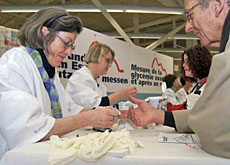Smoking raises the risk of diabetes

As if lung cancer and heart disease weren't enough, Swiss researchers have discovered that smokers also face an increased risk of developing diabetes.
Those who light up regularly face a 44 per cent increased risk of developing type 2 diabetes compared with non-smokers, according to data published in the latest issue of the Journal of the American Medical Association.
“We knew a few studies had already assessed this link, but we didn’t expect to find so many – we found 25 studies and all except one showed that smokers faced an increased risk of diabetes,” Carole Willi from Lausanne University told swissinfo.
Willi and colleagues conducted a systematic review and meta-analysis of studies describing the association between active smoking and the incidence of type 2 diabetes or other glucose metabolism irregularities.
Type 2 diabetes – the form of the disease often associated with excess body weight, poor diet and a sedentary lifestyle – is becoming increasingly common in many countries, including Switzerland.
Willi found that the risk of developing this type of diabetes was even higher for heavy smokers. Those who sparked up at least 20 times a day had a 61 per cent higher risk for diabetes than non-smokers.
She also found that quitting smoking reduced the danger, with former smokers seeing a 23 per cent higher risk than non-smokers, far lower than the risk for current smokers.
“On a public health level, this is very important because diabetes incidence is dramatically increasing. The avoidance of diabetes would then be another good reason for smokers to quit or for non-smokers not to begin,” Willi said.
Thirty per cent of Swiss smoke, according to 2007 figures.
Smoking gun
Willi admitted that the primary studies used for the review could not prove smoking was a cause of diabetes, but she said they did meet several recommended criteria to suggest this.
“It’s true that [the increase in diabetes] could be related to other unhealthy behaviour such as a lack of physical behaviour or an unhealthy diet or stress. But we have some elements that allow us to think that it could be causal.”
First, she said, there was a temporal relationship: the cigarette smoking preceded diabetes incidence in all studies.
“Another factor, which I think is the most important, is that there is a […] relationship – the more people smoke, the greater the risk of diabetes,” she said.
Third, a causal link could be explained biologically, in that smoking may lead to insulin resistance or inadequate compensatory insulin secretion responses, according to several but not all studies.
swissinfo, Thomas Stephens
According to the World Health Organization, diabetes causes about 5% of all deaths globally each year.
80% of people with diabetes live in low and middle-income countries.
Most people with diabetes in low and middle-income countries are middle-aged (45-64), not elderly (65+).
Diabetes deaths are likely to increase by more than 50% in the next 10 years without urgent action.
Ninety per cent of all diabetics are type 2. The rise of diabetes type 2 is causing widespread concern among health experts. In the next 20 years the number of those affected is expected to rise to 380 million worldwide.
Diabetes is a disease in which your blood glucose, or sugar, levels are too high.
Glucose comes from the foods eaten. Insulin is a hormone that helps the glucose get into your cells to give them energy. With type 1 diabetes, your body does not make insulin. With type 2 diabetes, the more common type, your body does not make or use insulin well. Without enough insulin, the glucose stays in your blood.
Over time, having too much glucose in your blood can damage your eyes, kidneys, and nerves. Diabetes can also cause heart disease, stroke and even lead to amputations.
Symptoms of type 2 diabetes can include fatigue, thirst, weight loss, blurred vision and frequent urination. Some people have no symptoms.

In compliance with the JTI standards
More: SWI swissinfo.ch certified by the Journalism Trust Initiative



You can find an overview of ongoing debates with our journalists here. Please join us!
If you want to start a conversation about a topic raised in this article or want to report factual errors, email us at english@swissinfo.ch.